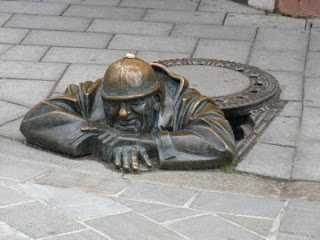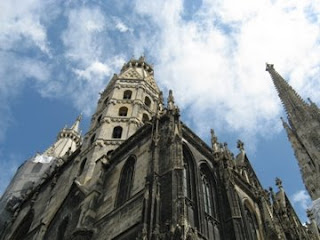
Proud Ambassador of the United States
Made with my Guestmother
I'm beginning to suspect that I'm not numbering these things correctly any more. Eh.
I wanted to talk to you today about one of the most curious of things. That is to say, what it means to be an American in Europe. I suppose you could say that is what I've been talking about this whole time, and I would have to agree that you were right. But I would agree in one of those way that was more along the lines of, "ok," "maybe," "you're probably right," and both of us would be unsatisfied with the direction the conversation had taken. So let us avoid that and both roll up our sleeves and get down to the serious business of telling stories.
Story Number One: The Church by Westbahnhof

Said Church
By Westbahnhof
Somewhere along the Gurtle, the road that runs around the inner districts of Vienna in a way that Robert Moses would certainly disapprove of, there is a rather large church next to (as is surprisingly seldom the case) a very large train station. It is also of course next to a very large proprietor of adult matierials, a fact that at least one observer has found amusing in a most depressing way. All in all it is a suprising place to have one's first experience with true Anti-americanism.
Now walking into European churches has its own kind of ritual associated with it, one that I would guess is frought with a great deal more angst than that faced by the actual religious observer . The laity has a purpose, they know why they are there, while the tourist has no such security. He walks around, classifying everything in sight ("my isn't that a wonderful set of ribbed Gothic vaulting?" he may say to his friend, who knowing that his companion is probably showing off and most likely has no idea what he is talking about, mumbles something along the lines of "I was just about to say that myself!" because he of course does not want to look stupid himself), and making a general slow walk around the ambulatory, attempting, however futily to take enough pictures that he can thereby put the whole somber establishment into his coat pocket and bring it home with him. Of course, somehow, when he shakes out the contents of his camera into his computer it never comes out quite right. Despite this he is still careful to point out the ribbed vaulting to his friends, who for reasons he can never quite understand, always seem about to mention it themselves.
[The trick that I have found is to look at churches as performative spaces, to go when the organ is playing, or the choir is singing, and observe the hall of worship as a living space, but that is neither here nor there].

Darkness Falls
Fence by the National Library
Having made my rounds, seen all of the various chapels, gazed at the Neo-something-or-other ceiling and feeling rather full of culture, thank you very much, I made my exit from the building, only to be accosted by a foreign looking man attempting to offer me literature about the church. After a remarkably linguistically ambiguous conversation, in which he began by adressing me in English and continued to do so despite my use of only German, he eventually came down very serious business of where I was from. Upon hearing that I was American, and after some thought deciding that indicated that I could speak English, he looked at me very seriously and told me that he would tell me something that I would never forget.
Which, considering he proceeded to describe to me that because America spends too much of its time mucking around in the world's business trying to make everyone do its bidding, one day all of the nations of the world would gather together and crush it, I doubt I shall. It was an odd message to receive in the entrance way to a church, an odder one still to receive from someone who was trying to sell me historical information about said church moments before.
This needless to say put me in an odd sort of spot.
My first reaction, the obvious American one of, "well if it weren't for us you'd all be speaking German now" I figured wouldn't pack so much of a punch for obvious reasons. Nor did I feel that the time was ripe for explaining that, perhaps almost two hundred and fifty years of American foreign policy amounted to something slightly more subtle than "pushing people around," or the fact that every other Great Power in history had acted in a similar manner, or even admitting that even if he was right in some cases that our foreign policy hadn't been the best that still wouldn't seem to justify the annihilation of a nation of 300 million people. But still he demanded a response.
The answer that I realized that I should have given later was this. Stop thinking of America as some faceless machine bent on bringing the world to its ends and start thinking of it as people. When a parents gets up in the morning, he doesn't wonder how best he can best bring death upon the various peoples of the world over a bowl of genetically modified cereal made from tears of third world children. He gets up and wonders how he's going to make enough money to send his kid to school when the economy is tightening. He wonders how much longer he's going to be able to keep his job in this sort of world, how well is daughter's sports team is doing, whether that new boy she is spending time with is trouble. He wonders, he works, he eats, he walks the dog, and he tries to provide for those around him. You might be able to confuse him for anyone else in the world, it just happens that his passport says that he is American.
But I did not have time to give this response, I was too busy listening to him talk about Europe was an ideal peaceful place. So I looked him in the eyes, doffed my cap at what I deemed to be an appropriately rakish angle, and remarked, "you're right, there's never been a war in Europe before."
And I walked out.

Lingering Memories
An Antiaircraft Tower Converted into an Aquarium
The 7th Bezirk
































